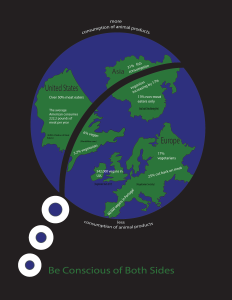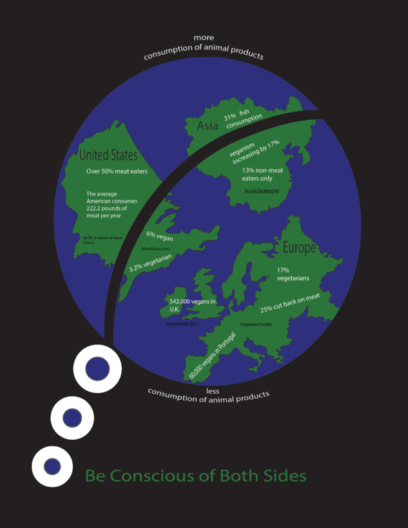BY: TYRA LEESMAN
PRINT EDITOR-IN-CHIEF
Veganism gets a bad reputation for being overly-strict and extreme. Loud-mouthed, bleeding-heart activists throwing buckets of red paint on fur-wearing  concert-goers does nothing to improve the image of those who choose the plant-based lifestyle.
concert-goers does nothing to improve the image of those who choose the plant-based lifestyle.
The truth is, veganism isn’t perfect. It has a laundry list of pros and cons each person must carefully consider before converting. In the end, however, the transgressions being made in the American food industry make veganism a worthwhile consideration.
Eating a local, organic vegan lifestyle makes sense when considering the fact the food eaten in Missouri is grown elsewhere, the space required to raise livestock is vast in comparison to the space needed for produce, and the use of chemical pesticides and improper stewardship of the limited soil, air and water that Earth possesses could very well lead to the universal extinction of life on the planet in a matter of a century or two.
The bottom line – this planet cannot continue feeding its burgeoning population in the same manner it has in the past. The meat industry’s impact is detrimental, and somewhat irreversible. The air, soil, water and humans themselves are at an increasing risk.
California is on fire, and its seemingly-endless droughts literally add fuel to that fire, edging the region toward a massive “super-drought” as farmers dump trillions of gallons of water on the fruits and vegetables being eaten here in Missouri. Water tables drop lower and lower every year because the deeper California drills to reach its water, the deeper the water flows. Take note: water flows downhill.
This produce could easily be grown here. Instead, it is picked before ripeness and shipped via diesel-burning semi-trucks across the country, where it is ripened chemically in an ethylene gas chamber. Before produce spoils, it is thrown out due to blemishes, bruising, oxidation, and arbitrary expiry dates.
In many U.S. states, farmers with large acreage are required to grow certain crops. Often, it is soybeans or corn, which are not used for human consumption but livestock feed, plastics and fuel.
The amount of land required to feed a single American on an average omnivorous diet is around the size of two football fields yearly. That estimation includes space for corn and soybeans, which could go directly into the human body rather than through an animal first. This same two-football-field acreage would feed 14 people on a vegan diet. That is a 1,400 percent increase in full bellies.
During the process of growing corn and soy, pesticides are dumped from low-flying planes, which are dangerous to human skin, and therefore the farmer must wear heavy protective gear in his own fields.
Completely disregarding the fact that humans are consuming these chemicals, the damage done to soil (a non-renewable resource, by the way), air and water-tables is tremendous. That’s where organic produce matters, even if one does not believe in the health benefits of avoiding carcinogenic chemicals.
One argument is that “organic farms don’t have to prove they aren’t using chemicals.” This is false. Should one visit an organic farm and ask for themselves, one would see regulations on certified organics are strenuous, redundant, and thorough.
Obviously, veganism is a bit healthier than the average American diet if only for the increased vegetables.
However, this doesn’t make veganism “healthy.” Oreos, Twizzlers, Swedish Fish, most breads, cocoa, and soda are all vegan.
Though many people convert entirely to veganism with no difficulty, those with certain blood types are more prone to deficiency and anemia. Some find that their bodies do not absorb B-vitamins, D-vitamins, omegas or iron from plant material as readily as from animal sources.
Veganism goes back a long time.
It is most often attributed to holy people in India, who saw taking the lives of animals for one’s own gain as a lowly act. However, food sanitation being what it was in that time and place, these vegans were consuming some mites and insects in their grains. When these same vegans moved to Britain during the occupation, they began to drop dead from deficiencies. Food sanitation and colder temperatures in Britain meant there were fewer sources of protein crawling around in the storehouses.
Humans must find a middle-ground between responsibly-grown, plant-based food sources and the Iron, proteins and B and D vitamins that often require animals to sacrifice their lives.
Some say it is too late for this planet. Even if that were so, what kind of person does one want to be? Someone who gives up? Or someone who works hard to buy the world a little more time to find a way to save itself?
It’s not about the quality of the result, but the quality of the person who strives for what is right.
Try veganism. It’s not better, but humanity is.
Graphic by Lauren Johns










